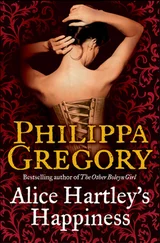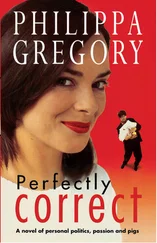I nodded, and looked at his paper. It was less than I had hoped, rather a lot less. But it was treble what we would get in the Midhurst market, and double what we would get at Chichester. More to the point he would pay me now, not in six weeks’ time when the grain was ripe; then a bumper crop could bring a bonus. The money chest beside my desk was nearly empty, and the loans would fall due again in July. I could not refuse him, even if I had wanted to. But his talk of shady lanes, and a silent village, had me shivering again.
We had never sold the crop away from our people before; but if he thought our people might turn against me, might threaten me to my face, then I would not hesitate to save the land for me and my son, the only way I knew. I did not wish them to starve; I did not mean them to suffer. But they had to play their part in winning Wideacre for Richard. And when Richard was Squire everyone would agree that it would have been worth the price, even this cruel price of fear for me and hunger for them.
But, in truth, when he spoke to me of shady lanes and angry men I felt such blind fear, and unreasoning fear, that I would have starved the whole of Acre. Somewhere, near or far, from Wideacre land, was the Culler. He had threatened me last year. This year he had sent me that terrible little tinderbox. He was telling me as clearly as he could that there was fire coming for me. That the cull of the gentry would start with me. And so I cared nothing for anyone who might help the Culler, or succour him, or point him to the Hall and say, ‘Take her, she is our beloved Miss Beatrice no longer.’ And while he was near my land, or while his mind was on me, even if he were far away, I would rather have money in the chest than corn in the fields or grain in the barns. He could not burn gold. He could not attack me safe in this room.
‘I agree,’ I said neutrally.
‘Good,’ said Mr Gilby. ‘You’ll have a draft on my bank within two days. You’ll reap it yourself?’
‘Yes,’ I said. ‘But you had better send your own wagons down. We don’t have the carts or the beasts to take it all to London.’
‘Good,’ he said again, and gave me his soft hand to shake on the deal. ‘A handsome place you have here, Mrs MacAndrew,’ he said, gathering his hat and gloves.
I smiled and nodded.
‘I am looking for a place like this myself,’ he said. I raised my eyebrows and said nothing. It was the way of the counties around London, but I had not thought Sussex would suffer so soon from these city-bred merchants setting themselves up as Squires. They brought their city airs and graces into the country. They understood neither the land nor the people. They muddled along with farming and they wrecked the land by forgetting to rest it. They spoiled whole villages by taking servants up to London and then sending them home again. They lived on the land but they had no heart for it. They bought and sold it as if it were a length of cloth. They belonged nowhere, and bought anywhere.
‘If you were considering parting with Wideacre …’ Mr Gilby started engagingly.
My head jerked up. ‘Wideacre!’ I said outraged. ‘Wideacre will never be for sale!’
He nodded, an apologetic smile on his face.
‘I am so sorry,’ he said. ‘I must have misunderstood. I thought you were selling the crops and the woods preparatory to selling the estate. If you had been I would have paid a very fair price, very good indeed. You’d not get a better one, I assure you. I had the impression that the estate was rather overcommitted and I thought …’
‘The estate is managing wonderfully,’ I said with a tremor of rage in my voice. ‘And I would be bankrupt before I parted with it. This is the inheritance of the Laceys, Mr Gilby. I have a son and a niece who are to come after me. I would not sell their home. I would not sell my own home.’
‘No, of course, of course,’ he said pacifically. ‘But if you should change your mind. If Mr Llewellyn were to foreclose, for example …’
‘He will not,’ I said with an assurance I did not feel. What talk was there about Wideacre in the money-men’s clubs? Would they form a ring against us and foreclose on the estate to win for themselves one of the biggest prizes in Sussex? Had my borrowings not been discreetly spread around London at all, but had played straight into the hands of a ring of cronies who even now calculated the months before I should be ruined? And what did Mr Gilby, a corn merchant, know of Mr Llewellyn, a dealer in land and wood from the other side of the City?
‘Even if he did, I have sufficient funds. I am a MacAndrew,’ I said.
‘Of course,’ said Mr Gilby, his black eyes betraying his secret knowledge that the MacAndrew money was closed to me. He might even know that the MacAndrew fortune was working against me.
‘I’ll bid you good day then,’ he said, and he took himself off without another word.
He left me still. He left me silent. He left me cold with dread. It was bad enough to know that the Culler and all the lawless men of his rank might be planning against me, waiting to come to me. But if my own people — those who slept between linen sheets and ate off silver plate — were plotting against me, then I was lost indeed. If the hard-faced money-men knew of me, knew of the mounting pile of debts and the empty cash box, then Wideacre and I were both in jeopardy. I had not thought that they might all know each other. I had forgotten that men like to make little clubs, like to be in packs, like to bully as a gang. Alone and isolated from the outside world I had not realized that there might be eyes watching me, ears listening for the first note of hesitation, and smiles exchanged as they heard of one heavy debt after another, and no sign of my getting clear.
I could fight them with the easy productive wealth of Wideacre at my back, and a village full of people who loved me and would work for free rather than I should lose a battle against strangers. Or I could fight an angry village, a bitter workforce. But I could not fight the lower orders and the people of my own rank at once, and hope to win. And while I was undermining and attacking the poor, the wealthy were undermining and attacking me. With a sullen, silent village on one hand and a secretive ring of creditors on the other I was surrounded by peril. And in the middle of it all — like a bone between two dogs — was Wideacre. And I could no longer feel for Wideacre.
I gave a little moan of sorrow and exhaustion and laid my face on my hands on my hard desk and stayed still until the summer evening grew grey outside my tall windows and bats criss-crossed the evening sky. Somewhere, from the wood, a nightingale started singing. I longed only for rest.
I had not reckoned with Celia. I began to think I had never properly reckoned with Celia. She came into my office as soon as the carriage returned. She came in, taking off her bonnet, and never even glanced at the mirror over the mantelpiece to see if her fair hair was smooth.
‘We passed a post-chaise on the drive with a gentleman in it,’ she said. ‘Who was he, Beatrice?’
I glanced at the papers on my desk and looked at her with raised eyebrows as if to imply that I found her curiosity impertinent. She met my eyes look for look. And her pretty mouth was not smiling.
‘Who was he?’ she asked again.
‘It was someone come to see a horse,’ I said blandly. ‘Tobermory’s foal out of Bella. It seems that the fame of the Wideacre hunters is spreading.’
‘No, it wasn’t,’ Celia contradicted me, her voice even. ‘It was a Mr Gilby, the London corn merchant. I stopped the carriage and spoke to him.’
I flushed with irritation but I kept my voice steady. ‘Oh, him!’ I said. ‘I thought you meant another gentleman. I have had two visitors this afternoon. Mr Gilby was the last.’
Читать дальше
Конец ознакомительного отрывка
Купить книгу












